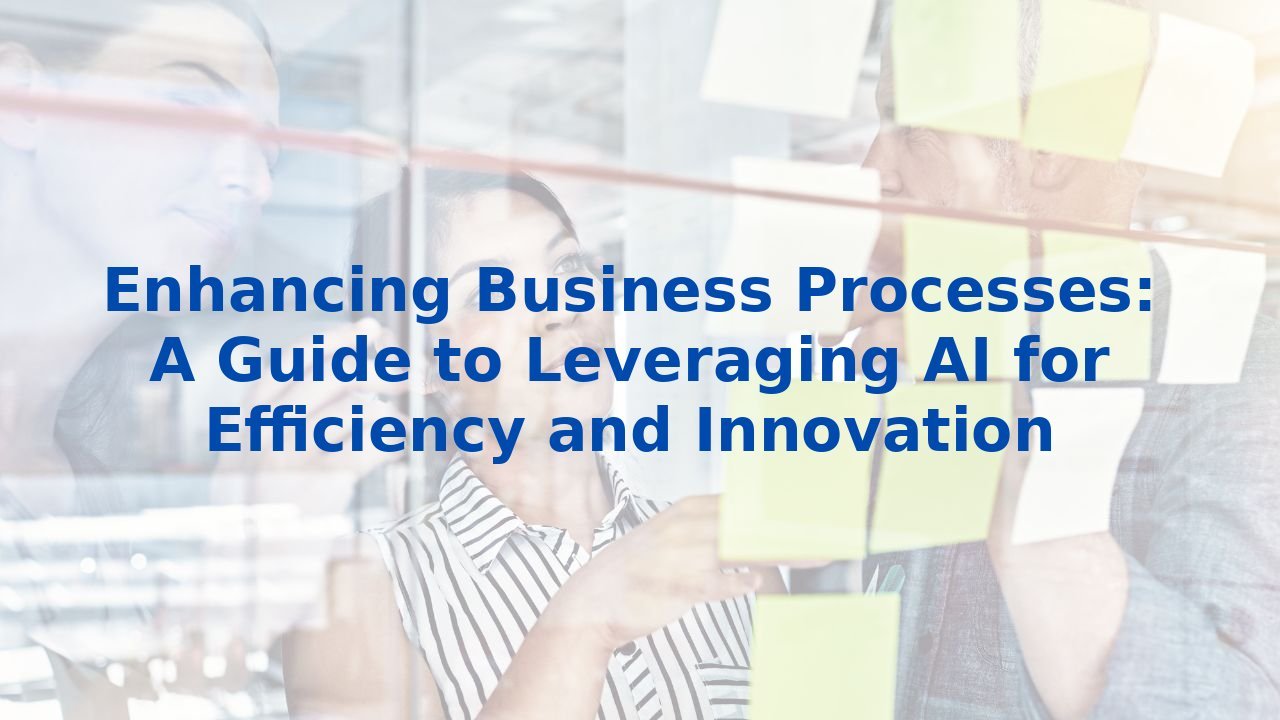Enhancing Business Processes: A Guide to Leveraging AI for Efficiency and Innovation
Enhancing Business Processes: A Guide to Leveraging AI for Efficiency and Innovation
In an age where rapid change is the norm, the ability to adapt stands as a critical differentiator in the business landscape. One pathway to achieving such adaptability is through the innovative leverage of Artificial Intelligence (AI) in Business Process Management (BPM). In this guide, we'll explore not only the general business processes impacted by AI but also the tremendous benefits this technology offers, particularly in enhancing efficiency and driving innovation.
Understanding Business Process Management
At its core, Business Process Management encompasses the systematic approach to optimizing and managing business processes. This involves analyzing, designing, executing, and monitoring processes with an eye towards improving efficiency, productivity, and quality. Traditionally, BPM has been characterized by manual processes that burden organizations with time-consuming tasks and a high propensity for errors.
How AI Enhances Business Processes
AI is not merely a buzzword; it represents a paradigm shift in how businesses approach BPM. Its ability to automate and optimize various dimensions of business operations marks a new era of productivity. Let's delve into some of the key areas where AI makes a profound impact:
Data Analysis and Visualization
AI's capacity to process large datasets quickly uncovers trends and predictions that can elude human analysis. This data-driven insight leads to informed decision-making that is both tactical and strategic, ultimately reducing the time and effort traditionally associated with manual data handling.
Process Building and Automation
Imagine a workload where you can create and map processes seamlessly with the simple input of parameters. AI accomplishes this by swiftly generating new workflows while also taking over laborious manual tasks such as data entry and document processing. This transition frees up valuable human resources, allowing them to focus on strategic initiatives rather than everyday tasks.
Process Optimization
Through advanced process simulation, AI analyzes historical data to model complex interrelations within processes. By identifying deviations and potential weaknesses, businesses can gain critical insights into areas ripe for optimization. This enables companies to enhance their operational frameworks proactively.
Real-Time Monitoring and Decision-Making
The capabilities of AI extend into real-time process monitoring. Through process mining, organizations remain updated on their operations, allowing timely interventions as challenges arise. AI supports decision-making by simulating various scenarios, ultimately steering enterprises toward optimal choices in a proactive manner.
Benefits of AI in BPM
Integrating AI within BPM yields a multitude of benefits, notably:
- Improved Efficiency: By automating mundane tasks, AI reduces manual labor and human error, leading to boosted productivity and operational efficiency. This shift enables a laser focus on strategic goals.
- Enhanced Decision-Making: Predictive analytics refine decision-making processes by leveraging identified patterns within data, allowing businesses to stay ahead of market fluctuations.
- Proactive Risk Management: AI's ability to forecast disruptions helps organizations take preventative measures, safeguarding against potential inefficiencies.
The Role of Employee Training in AI Adoption
The potential of AI isn't realized solely through technology; it radically depends on the human factor. After all, even the most innovative tools require skilled operators to harness their full capability. This is where training your employees comes into play:
- Adaptability: Training employees on AI technologies equips them to embrace new systems, ensuring a seamless transition into automated workflows.
- Efficient Use of Tools: Proper training instills confidence and competence, allowing team members to leverage AI tools effectively while minimizing errors.
- Strategic Focus: With routine tasks automated, staff can redirect their efforts towards high-impact activities, enriching their contribution to the organization's overarching strategy.
Conclusion
AI is not just altering the landscape of Business Process Management; it is fundamentally transforming it. By enhancing efficiency, decision-making, and risk management, AI fortifies organizations against the challenges of an ever-evolving market. Coupled with comprehensive employee training, businesses can maximize the advantages of AI technologies, ensuring they remain agile and competitive. It’s more than just about embracing technology; it’s about preparing your workforce for a future that is as innovative as it is unpredictable.
For organizations striving to equip their entire workforce with essential AI skills, consider exploring comprehensive training solutions that can truly transform your business processes.



